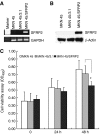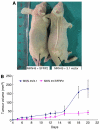Frequent epigenetic inactivation of secreted frizzled-related protein 2 (SFRP2) by promoter methylation in human gastric cancer
- PMID: 17848950
- PMCID: PMC2360406
- DOI: 10.1038/sj.bjc.6603968
Frequent epigenetic inactivation of secreted frizzled-related protein 2 (SFRP2) by promoter methylation in human gastric cancer
Abstract
The role of secreted frizzled-related protein (SFRP) genes in gastric cancer remains largely unknown. We determined the frequency and functional significance of SFRPs hypermethylation in human gastric cancer. The expression and methylation status of four SFRP members (SFRP1, 2, 4, and 5) in primary gastric cancer samples was screened. The biological effects of SFRP were analysed by flow cytometry, cell viability assay and in vivo tumour growth in nude mice. Among the four SFRPs, only SFRP2 was significantly downregulated in gastric cancer as compared to adjacent non-cancer samples (P<0.01). Promoter hypermethylation of SFRP2 was detected in 73.3% primary gastric cancer tissues, 37.5% of samples showing intestinal metaplasia and 20% adjacent normal gastric tissues. Bisulphite DNA sequencing confirmed the densely methylated SFRP2 promoter region. Demethylation treatment restored the expression of SFRP2 in gastric cancer cell lines. Forced expression of SFRP2 induced cell apoptosis, inhibited proliferation of gastric cancer cells and suppressed tumour growth in vivo. Moreover, methylated SFRP2 was detected in 66.7% of serum samples from cancer patients but not in normal controls. In conclusion, epigenetic inactivation of SFRP2 is a common and early event contributing to gastric carcinogenesis and may be a potential biomarker for gastric cancer.
Figures






References
-
- Chan MW, Wei SH, Wen P, Wang Z, Matei DE, Liu JC, Liyanarachchi S, Brown R, Nephew KP, Yan PS, Huang TH (2005) Hypermethylation of 18S and 28S ribosomal DNAs predicts progression-free survival in patients with ovarian cancer. Clin Cancer Res 11(20): 7376–7383 - PubMed
-
- Fukui T, Kondo M, Ito G, Maeda O, Sato N, Yoshioka H, Yokoi K, Ueda Y, Shimokata K, Sekido Y (2005) Transcriptional silencing of secreted frizzled related protein 1 (SFRP 1) by promoter hypermethylation in non-small-cell lung cancer. Oncogene 24(41): 6323–6327 - PubMed
-
- Heller RS, Dichmann DS, Jensen J, Miller C, Wong G, Madsen OD, Serup P (2002) Expression patterns of Wnts, Frizzleds, SFRPs, and misexpression in transgenic mice suggesting a role for Wnts in pancreas and foregut pattern formation. Dev Dyn 225(3): 260–270 - PubMed
-
- Ilyas M (2005) Wnt signalling and the mechanistic basis of tumour development. J Pathol 205(2): 130–144 - PubMed
-
- Kang GH, Shim YH, Jung HY, Kim WH, Ro JY, Rhyu MG (2001) CpG island methylation in premalignant stages of gastric carcinoma. Cancer Res 61(7): 2847–2851 - PubMed
Publication types
MeSH terms
Substances
LinkOut - more resources
Full Text Sources
Medical
Molecular Biology Databases
Research Materials

